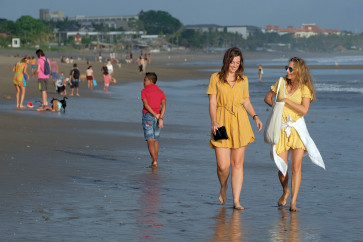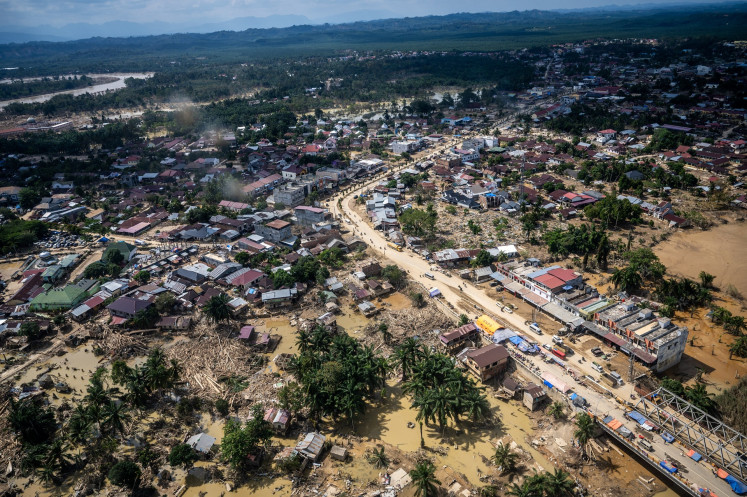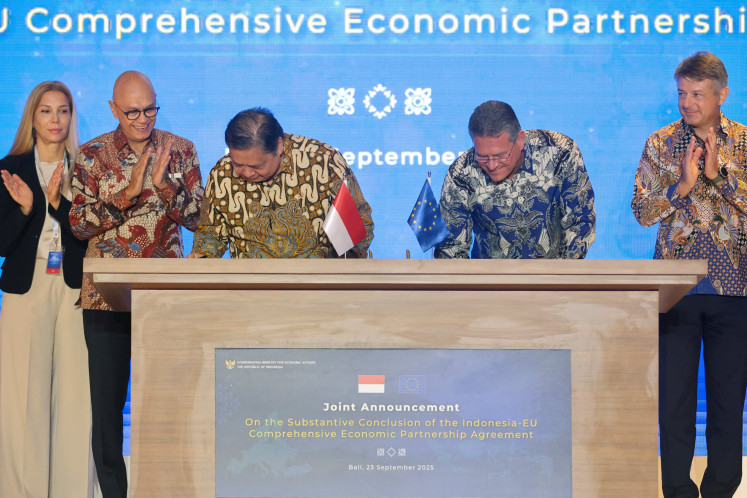Popular Reads
Top Results
Can't find what you're looking for?
View all search resultsPopular Reads
Top Results
Can't find what you're looking for?
View all search resultsFor malls, ‘ngabuburit’ means good business
It used to be the term that only defines the kind of activities of Muslims during the dusk while waiting for the time to break their fast
Change text size
Gift Premium Articles
to Anyone
I
t used to be the term that only defines the kind of activities of Muslims during the dusk while waiting for the time to break their fast.
Ngabuburit has gone beyond that, as businesses also use it as marketing gimmick that can lure many Jakartans to spend their time before breaking their fast at the city’s ubiquitous shopping centers.
“I never go out in the afternoon during Ramadhan; it would be too exhausting. I started to go out at about 3 or 4 p.m to the malls until I get tired,” said Yuliana Fitriani, a resident of Kalimalang in East Jakarta.
She loved spending her ngabuburit time at Jakarta’s malls because usually during Ramadhan until Idul Fitri, or locally known as Lebaran, the malls offered great Ramadhan sales.
“Strolling around the mall is always fun. Hunting for clothes and shoes amid the great discounts, or just window shopping is fun to do while waiting for bedug [Indonesian traditional drums used to mark victory over the long day of fasting],” she said.
“That way I can distract my mind a little bit from my hunger and thirst until the sundown.”
Afterwards, it was time for her and her family to compete with other mall visitors to secure seats at restaurants or food courts to break their fast, said the frequent visitor of Plaza Semanggi and ITC Ambassador shopping malls.
Ngabuburit is derived from the word burit, which in Sundanese means dusk. Gradually, the word is commonly used to define the activity while waiting for breaking-the-fast time, not only in Sundanese-speaking cities, but also other cities. Therefore, in 2009, it officially became a new sub-entry in the Great Indonesian Dictionary (KBBI).
Stefanus Ridwan, chairman of the Indonesian Shopping Centers Association (APPBI), said that it was not just the string of discounts that had lured visitors to spend their ngabuburit time at shopping centers.
“Various kinds of events that are organized a few hours before fast-breaking time have also contributed to the large number of mall visitors,” he said.
The large number of shoppers led to the significant increase of sales for some merchants, he added.
“Restaurants at malls can record around a 100 percent increase in sales during Ramadhan, while for fashion merchants, the increase can be more than 40 percent,” Stefanus said.
The events held at malls during ngabuburit time include, fashion shows, talk shows, music performances, food bazaars and many more.
“I am sure the total shoppers during Ramadhan this year will increase significantly compared to last year,” Stefanus said.
The APPBI reported that around between 20,000 and 60,000 people went to malls on regular days last year.
According to the Jakarta chapter of the Indonesian Association of Hotels and Restaurants (PHRI), restaurants that could accommodate large groups of people for the breaking-the-fast gathering also usually book around a 20-30 percent in sales during Ramadhan.
Giant supermarkets in Jakarta also saw an increase in their sales during Ramadhan. The competition started to become more fierce as every supermarket tried to give the best offers to shoppers during the time of the largest annual shopping spree.
Indonesian Retailers Association (Aprindo) deputy head Tutum Rahanta said sales during Ramadhan and Idul Fitri usually contribute up to 30 percent of total annual sales among hypermarket operators.
For some Jakartans, however, ngabuburit does not only have to be at malls, although they finally opt to go to malls to find food to break the fast.
Ahmad Faisal, 29, for example. He said that during the weekend, he tried to find alternatives to spend his ngabuburit outside Jakarta’s malls.
“My friends and I want to find something different. We want to spend our ngabuburit somewhere else; parks for example, before heading to malls to find food,” he said.









